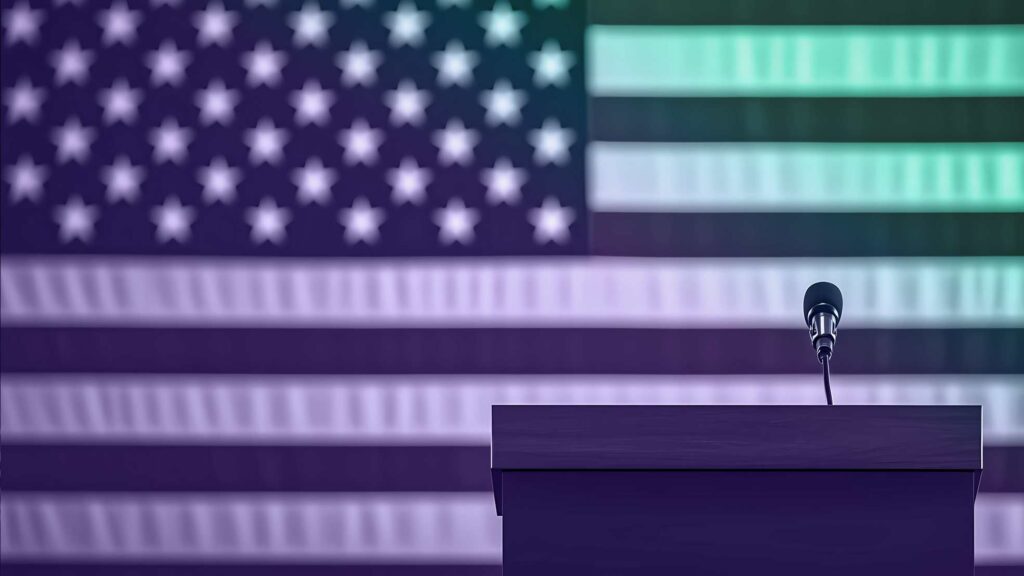August 26, 2024
By Daniel Silverberg and Elena McGovern, co-heads of Capstone’s National Security Team
Capstone’s national security team was on the ground for the Democratic National Convention (DNC) this past week. While foreign policy was a muted aspect of this week’s Mardi Gras-like proceedings, subtle developments signaled where Democrats might go in a Harris administration and politically resonant messages on the campaign trail—themes we think corporations and investors should be paying attention to in the runup to the November election. These themes are all the more resonant after a weekend in which Israel launched preemptive strikes against Hezbollah, and US diplomacy, combined with military deterrence, appears to have stemmed a broader war for the moment.
Harris Tilts Center on Middle East and Defense
Notwithstanding allegations that Harris is a natural ally of the Democratic left, Harris’ acceptance speech provided another data point regarding where the Democratic party currently stands. Harris tightly hewed to Biden’s positions on Israel and went further than expected on defense issues. She specifically referenced ensuring that the US has the most “lethal” military in the world – buzzwords for defense experts as support for increased defense spending – and explicitly supported both Israel’s right to defend itself and the US commitment to “ensure Israel has the ability to defend itself.”
Harris also called out Hamas as a terrorist organization that perpetrated sexual violence on October 7 while affirming the traditional democratic platform of a two-state solution. She did not explicitly condemn Israel’s conduct of the war, as demanded by activists. While cheers regarding Palestinian sovereignty were louder than the Israel comments during her speech, it was striking how loud the cheers on Israel were, which paralleled the warm reception given to two hostage parents on Wednesday night.
Conservative critics focused on alleged dissent at the convention, but there was little turbulence inside the convention hall. Harris’ measured remarks reflected an overall centrist turn at the convention and, for the most part, the absence of feared protests. Thirty thousand protesters were expected at one point; only 3500 materialized. Their absence might have given further latitude for DNC organizers not to give the stage to a Palestinian American speaker. Palestinian activists frustrated by this shunning threatened that Harris risked losing Michigan and progressive voters as a result, but there is no corroborating data to date for that contention.
Even Alexandra Ocasio Cortez, a progressive firebrand, delivered a traditional left-of-center speech, leading to speculations that she is either trying to position herself for House leadership or a cabinet appointment in a Harris administration. The convention crowd went nuts for Senator Elizabeth Warren, but she likewise stuck to fairly conventional talking points. Bottom line, this was not the progressive celebration party many expected.
Harris’ language re: the US ensuring Israel has the ability to defend itself was manifest over the last 24 hours, during which Israel preemptively struck multiple Hezbollah missile launch sites. US support not only involved provision of weaponry, but also deployment of a carrier strike group to deter further Hezbollah aggression, along with extensive diplomacy led by special presidential envoy Amos Hochstein to prevent larger conflict. For the time being, US efforts appear to be successful.
China Largely Ignored During the Convention
Trump referenced China 14 times in his acceptance speech, and both he, Vance, and numerous GOP speakers railed against China at the GOP convention. Trump accused China of stealing US jobs and technology and even revived the attack line of China as the source of the COVID-19 pandemic.
In contrast, Harris mentioned China only once (“I will make sure…[t]hat America, not China, wins the competition for the 21st century and that we strengthen, not abdicate, our global leadership.”). Democratic speakers generally did not mention China or were far more subtle in their references. For example, Representative Raja Krishnamoorthi, the ranking Democratic member on the China Select Committee, stated that Trump “will pit American against American, and that’s just what China wants for us — to fight amongst ourselves, because that’s how we lose.”
The contrast likely stems from the fact that Democrats do not see China as a resonant campaign issue and do not want to be perceived as engaging in xenophobic rhetoric. This hesitation could reflect Democratic reluctance to pursue a spate of anti-China measures the GOP will bring to the floor in September as part of ‘China Week’ and similar measures next year.
Don’t Underestimate Democratic Embrace of Patriotism
It was not coincidental that DNC aides passed out American flags after Kamala’s address. Chants of ‘USA! USA! USA!’ broke through numerous speakers and reached a crescendo during Harris’ address. The sense of patriotic “joy” was a key theme.
It is unclear whether the energy of the Democratic convention will translate into momentum for Harris. Harris successfully consolidated Biden supporters and traditional Democratic functionaries under her camp, but the race after Chicago remains at a near-dead heat. Capstone will continue to monitor the implications of election dynamics for clients.

Daniel Silverberg, co-head of Capstone’s National Security Practice

Elena McGovern, co-head of Capstone’s National Security Practice
Read more from Capstone’s National Security Practice:
US Defense and Foreign Policy in a Harris Admin
Emerging National Security Opportunities, Policy Shifts, and Chinese Consensus
For Every Action, an Equal Reaction: Renewed China Trade Conflict and the Likely Chinese Response



























